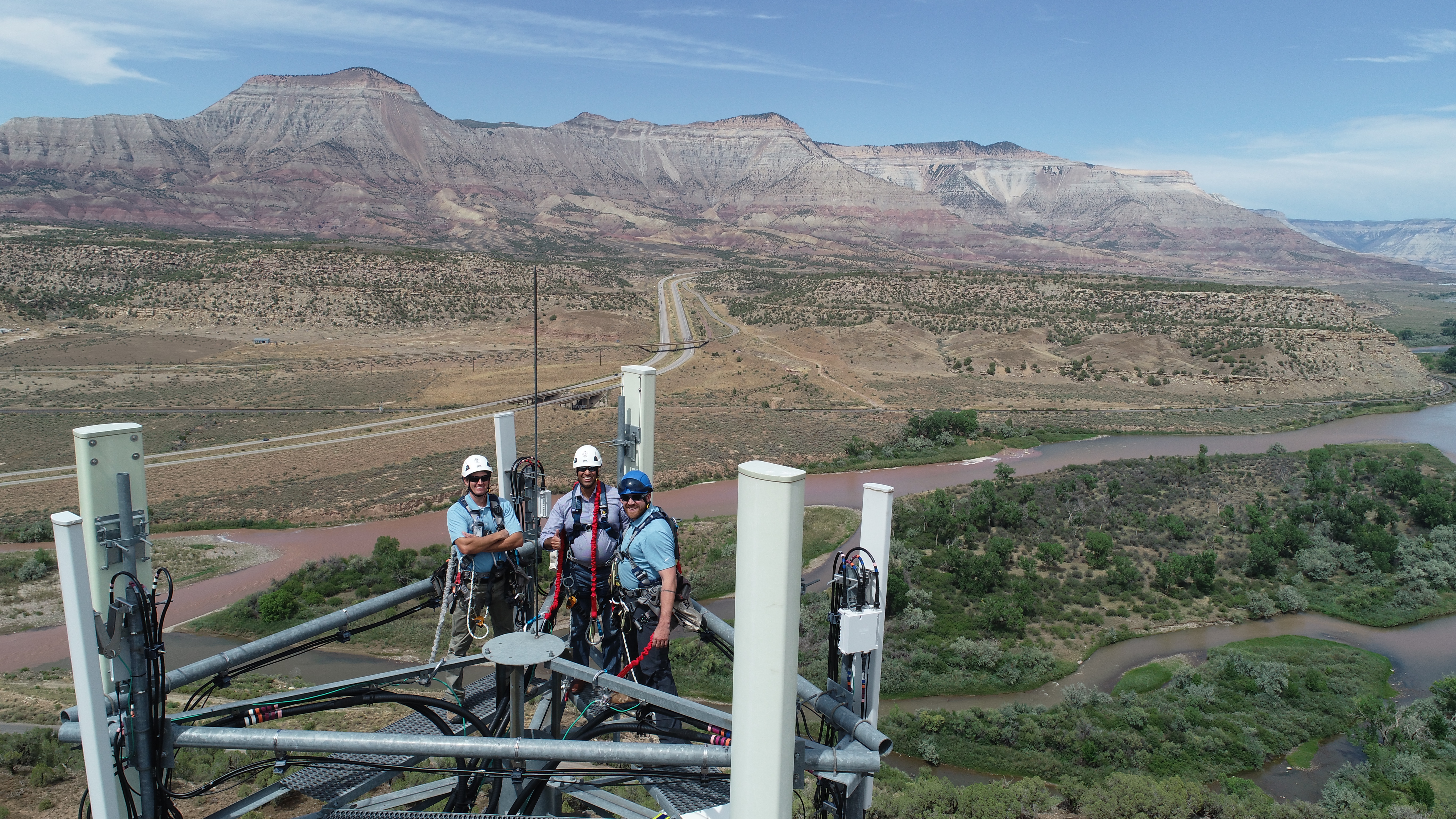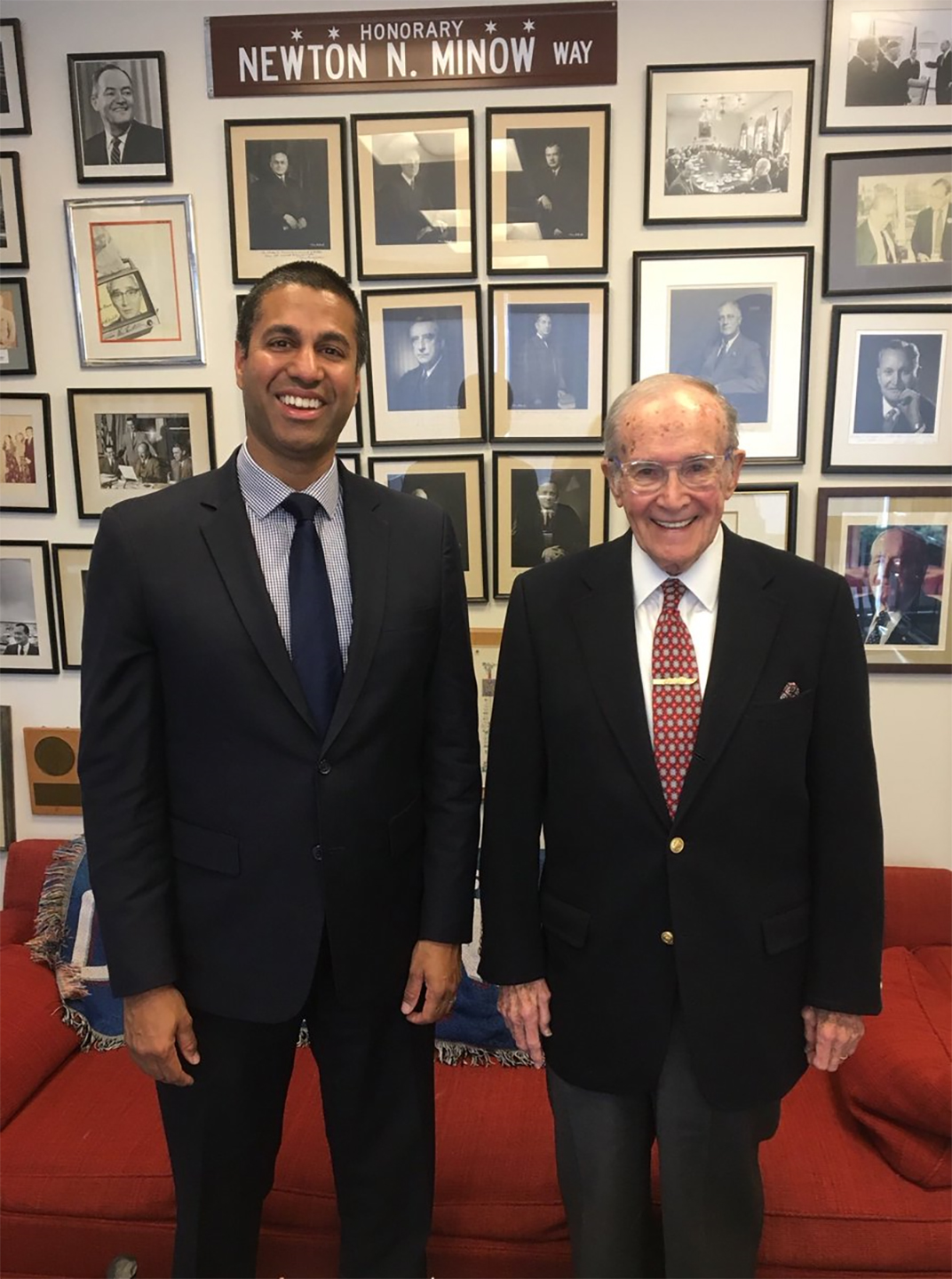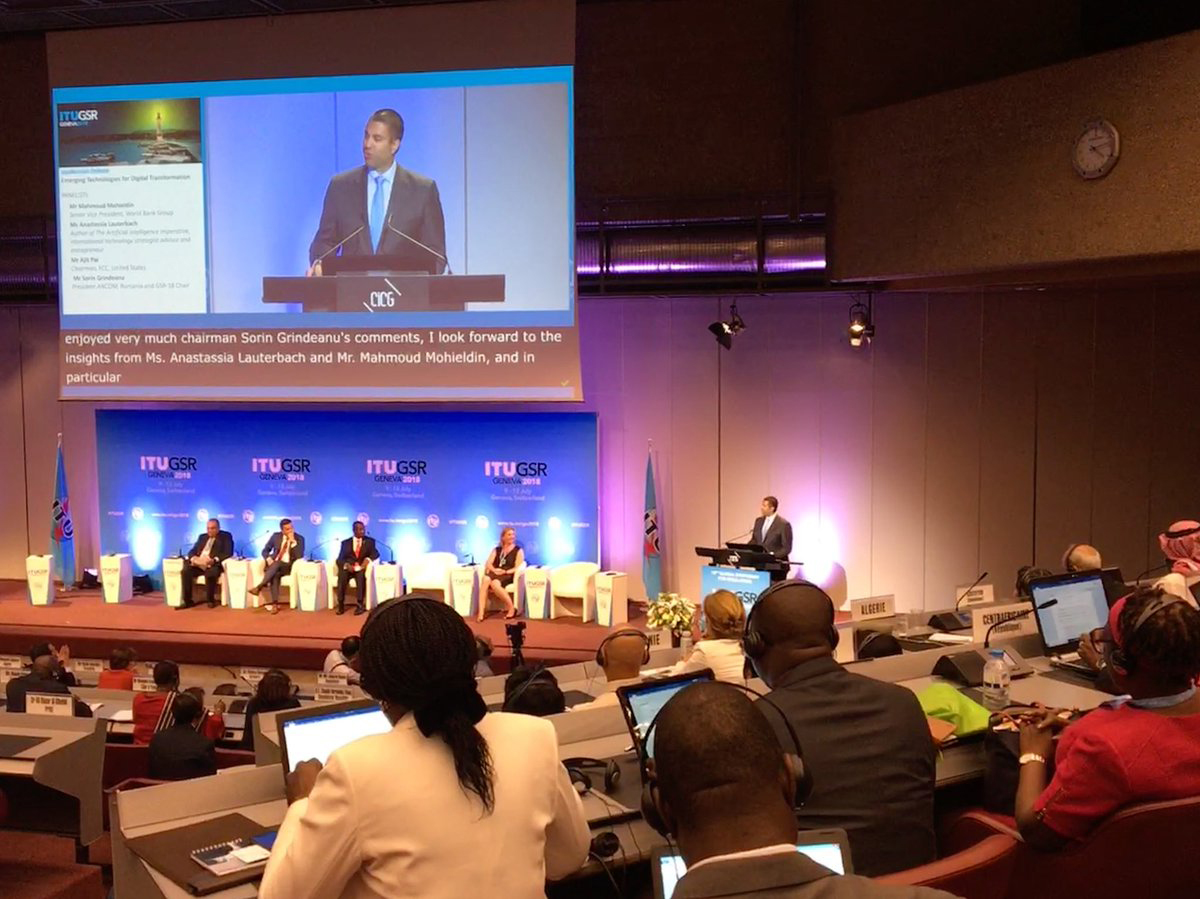Calculating The Value of Pai
The smarter way to stay on top of the multichannel video marketplace. Sign up below.
You are now subscribed
Your newsletter sign-up was successful
WASHINGTON — It has been two years, plus two government shutdowns, since then-senior Republican Federal Communications Commission member Ajit Pai was tapped by President Donald Trump to head the agency as chairman.

Since then, Pai has unwound network-neutrality regulations that he and his fellow Republicans argue were based in archaic law, taken steps to deregulate broadcasters and, for the first time, published in advance the texts of items to be voted on at public meetings. His generally deregulatory course is now being hammered by newly-empowered House Democrats who’ve pledged muscular oversight.
Pai has taken some shoves from those Democrats — he pushed back in this exclusive interview with Multichannel News — and despite taking personal heat over the rollback of the 2015 Open Internet Order, he said he has not soured on the town, the job or what he sees as his ongoing mission to close the digital divide and serve the public interest. Oh, and regrets over what he concedes can be a tough job, he doesn’t seem to have even a few, as he is unable to identify anything substantive he wanted to get accomplished that either hasn’t gotten done or isn’t in progress.
Raised in the Midwest and educated at Harvard, Pai is a fierce optimist in the face of often harsh criticism. Here’s an edited transcript of the first extensive interview on his tenure two years in.
MCN:Broadband has been billed as a magical connection — and of course it is — where doctors can diagnose you and cars can keep from running into each other. But that free flow of data has also been driving us apart through hate speech, Russian interference, political divides exacerbated by social media, privacy violations and algorithmic discrimination. Should the government be doing more to get at the dark side of the web?
Ajit Pai: That is an area that the FCC doesn’t currently regulate. There has been a lot of discussion on Capitol Hill about what, if anything, should be done about the laws to reflect some of those concerns. I would certainly defer to our elected officials on that front.
But I will say that, as someone who believes in the First Amendment, we have to make sure that we protect that core constitutional freedom of Americans to speak and to publish and to associate and, of course, that is something that has distinguished our democracy for many years. As the world goes digital, those constitutional freedoms are important. And it is an important conversation to have, but not one that is currently the FCC’s bailiwick.
MCN:But you have said in the past that there needs to be a serious conversation about whether the time has come to get edge providers to abide by transparency obligations and regulations. Do you think that time has come?
AP: It has long since come.
The smarter way to stay on top of the multichannel video marketplace. Sign up below.
A year and a half ago, when I gave a speech outlining these issues, I highlighted the fact that there wasn’t transparency and privacy was a concern. And I think that, if anything, the steady drumbeat of stories we get only reinforces that view.
I think what you see in Washington now and across the country is a bipartisan concern over the lack of transparency from some of these Silicon Valley tech giants, and whether it results in legislation or Federal Trade Commission action or something else, I don’t know. But what I do know is that American consumers are increasingly worried that their personal information may be used in ways they find repugnant. I think that is something for everyone to have a conversation about.
MCN:What oversight of broadband does the FCC have after the Restoring Internet Freedom order? Your critics have used terms like “abdication” to describe the FCC and net neutrality.
AP: We maintain oversight both through our transparency rule, which requires broadband providers to disclose various business practices, network-management practices and the like on their websites or the FCC’s website. We also require them to submit all kinds of forms — form 477, for example, detailing how they are deploying broadband — so we can measure how it is or is not progressing.
The notion that we have abdicated our responsibility in this area [broadband] is completely false, but it is par for the course for those for whom political motivations more than policy considerations have long been the primary draw.
MCN:Did the FCC either obstruct investigations into bogus net neutrality comments or fail to investigate them sufficiently?
AP: No. We haven’t obstructed anything and I have been very consistent about that.

MCN:You have signaled you would welcome Congress’s clarification of what the FCC’s authority over net neutrality is. Are you OK with Congress restoring the rules under clarified FCC authority if compromise legislation emerges?
AP: Whatever Congress decides, we are duty-bound to administer. Of course, I stand willing and able to work with Congress on what the terms of that legislation should be. But I think it is time for us to take a look at updating these rules.
It’s an eon ago in terms of the dynamic digital sector that we have, and so I think it would be useful for them to speak with a bipartisan voice on how to update the rules of the digital road to provide certainty and to provide consistency across the board. Do we want every player in the internet economy to face a similar regulatory landscape? We don’t want patchwork quilts of regulations state to state that create asymmetries. It would be useful for Congress to look at this.
MCN:But you would obviously prefer Congress not “clarify” that new rules should be Title II-based?
AP: Absolutely. I think the market-based approach is the right one and I think that President Clinton and his successors got it right when they said that we want to have a more marketplace approach, rather than a more government-based approach [common-carrier regulations under Title II of the Communications Act] that originated in the 1930s to regulate Ma Bell.
And I think if you ask anybody on the street which technology they think is innovative, the wired telephone or the internet, they would clearly say the internet. Part of the reason is that we have had more of a free-market approach and that approach has produced tremendous benefits for consumers over the past generations, benefits that were probably unthinkable even to those who established this framework back in the 1990s.
MCN:The new FCC appropriations bill said that many markets are “struggling” with market modification petitions [which allow satellite operators to import TV stations into so-called orphan counties, or areas where viewers don’t receive in-state programming because of their media market], and directed the agency to make sure it was following the wishes of Congress in the STELAR legislation to help those counties. Have there been issues with how you review or resolve those petitions?
AP: We definitely take those petitions very seriously and we try to work with people who express an interest in doing so.
For example, when Sen. Cory Gardner raised the issues about La Plata and Montezuma Counties in Colorado, I was one of the first back when I was a commissioner to highlight the need for us to make sure that these requests for market modifications were taken seriously and that we were trying to link communities with the information that came from states or regions that were of interest to them.
I do think it is important, especially when you are talking about public-safety information or state and local government, things like that, that there is a community of interest that may not be reflected in the information viewers are getting. So we definitely want to work together with Congress to make sure we are doing what we can to assist them in that regard. I field a lot of questions about this when I am on the road or testifying before Congress, and we do take it very seriously.
MCN:Democratic Sens. Ed Markey, Richard Blumenthal and Ron Wyden have called on you to investigate whether carriers were throttling and prioritizing traffic and not being transparent about it. Are you investigating that?
AP: I can’t comment on any investigations that may arise or may in fact be underway.
MCN:However you decide the C-band spectrum reallocation item, what can you say to assuage cable operators and broadcasters concerned their transmissions will not be sufficiently protected?
AP: Look, this is a very complicated issue. What I can say is we understand the concerns that have been expressed by those who rely on some of the spectrum in the C-band for delivery of their programming. That is one of the factors that the FCC will take into account as we deliberate on how best to proceed.
MCN:So no resolution yet?
AP: We’ve not prejudged any particular course of action. At this point, we are still studying the issue, meeting with stakeholders and taking feedback. So we continue to look forward to hearing from broadcast companies, cable companies and others who might have a view on how the FCC should proceed.
MCN:Coming up on the midpoint of your chairmanship, what do you view as your major accomplishments?
AP: It has been an exciting two years. We’ve had a pretty aggressive agenda on some of our core priorities — closing the digital divide, promoting innovation, protecting consumers and modernizing our regulations.
Particularly on that first point, closing the digital divide, I have been proud of the accomplishments we have been able to achieve, including a successful Connect America Fund auction in which we are allocating approximately $1.5 billion for rural broadband across 45 states. We are also making sure we are updating our regulations to make 4G LTE more available in parts of the country that don’t enjoy it today.
We have much more to do in the next two years but I am really grateful to the terrific FCC staff for the work that they have done to enable us to advance the ball on behalf of the public.
MCN:What has been your biggest disappointment, either something you didn’t get done or something about the job you didn’t expect?
AP: In terms of the substance, I can’t say that there are any. We have been able to execute on a lot of our agenda. I can’t say that there is anything that we have been able to push across the table that we regret or haven’t been able to push across the table yet that we won’t be able to accomplish.
In terms of the unexpected, I think that any FCC chairman would tell you that after two years on the job, it is a difficult and demanding position, but having a chance to lead this agency and set an agenda that delivers on the public interest and brings more people into the digital economy is a tremendous honor.
I can’t wait to get started on the next two years.
MCN:We thought you might have said the net-neutrality debate that got so personal and ugly and even scary. [Pai was the target of online attacks, including death threats and racial slurs.]
AP: Certainly, that was not a pleasant aspect of the job, but nonetheless at the end of the day perhaps it is the optimistic Kansan in me, the intrinsic willingness I have to look at the good that is in most people. I choose to think that they are much more concerned about the positive work that we’re doing in terms of closing the digital divide. So, when I think about the last few years, I don’t think about those negative attacks that were veering on personal attacks on me and my family.
What I do think about is the eighth grader in New Mexico who told me that, for the first time, she has broadband in her school. I think about the doctors in Moab, Utah, who told me that now, thanks to broadband, they can do things with telemedicine that they were never able to do in the analog age. I think about the school in Scottsville, Kentucky, that is now able to keep kids healthier because of a broadband connection with Vanderbilt. I think of the teams up in Pembroke, New Hampshire, that I visited that are better able to do their jobs of installing wireless infrastructure in the mountains of New Hampshire in part because of our regulatory modernization, which is enabling them to build the towers that will connect more people.
To me, that is really where the rubber meets the road. It’s not in the 280-character snarky tweet. It’s not in the politician that is gratuitously attacking us. It’s in the work we are doing for the American people. And, at the end of the day, that’s why I get up in the morning.
MCN:You have said you are going to finish your term. How about after that? Any political aspirations?
AP: I am going to be serving in this position for the next two years — barring my being drafted by the Kansas City Chiefs, which is always a possibility even at 46 years old. But, whatever comes after that will take care of itself. I am focused on doing the best job I possibly can here at the FCC.
MCN:On diversity, you got pushback from Democrats over eliminating one EEO form but not resolving an issue with another that could restart broadcast reporting of staff diversity. Any reason for doing the midterm EEO report deregulation first? And talk about your diversity efforts more broadly.
AP: I am very excited about the things we have done in terms of promoting diversity. For one thing, I am proud that we brought back the Advisory Committee on Diversity and Digital Empowerment, an advisory group that had previously been disbanded but, when I came into office, it was important to me for the FCC to stand up for a communications sector that reflected the diversity of this country.
MCN:What has the committee done?
AP: It has been very active on a variety of fronts — promoting broadcast diversity, for example. Also, for the first time I wanted them to focus on the lack of diversity in Silicon Valley. That is one of the issues they have been talking about and that now has some very broad support here in Washington, so that advisory committee is critical.
Additionally, I am very proud that in 2018 we finally set up an incubator program to encourage new entry into the broadcast business. This is an idea that had been discussed for so long — I believe it was first proposed when I was back in high school. We finally have a concrete framework for small, aspiring broadcast-station owners to pair with more established broadcasters to help them with training, financing and industry connections. I hope that through this program and those relationships, we will be able to see more diversity and competition in broadcasting. Diversity is a very important consideration.

MCN:But what is the holdup in the EEO diversity reporting form?
AP: The record was clear that the [midterm] form 397 was duplicative and didn’t really have continuing relevance when much of this information is available online. So, we made a very targeted decision to repeal that form. I look forward to working with my colleagues on the other issues they have raised and if they have ideas about how to proceed I am always here with an open door and an open mind to hear them out.
Contributing editor John Eggerton has been an editor and/or writer on media regulation, legislation and policy for over four decades, including covering the FCC, FTC, Congress, the major media trade associations, and the federal courts. In addition to Multichannel News and Broadcasting + Cable, his work has appeared in Radio World, TV Technology, TV Fax, This Week in Consumer Electronics, Variety and the Encyclopedia Britannica.

